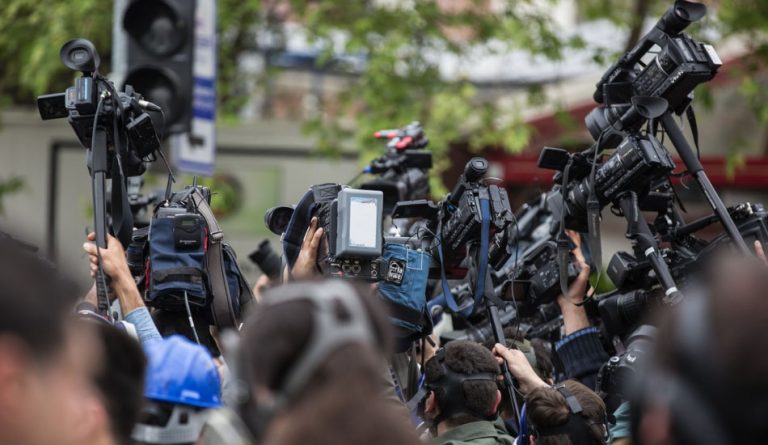A report by the Foreign Correspondents’ Club of China (FCCC) has found that foreign journalists’ working conditions in China deteriorated in 2020. According to the paper titled ‘Track Trace Expel: Reporting on China Amid a Pandemic,’ foreign reporters have run into roadblocks, and not one has reported that the situation has improved from previous years.
It appears that Chinese communist propaganda is in an escalating struggle with unbiased media over truth in news reporting. As stated in the paper, “Chinese authorities dramatically stepped up efforts in 2020 to frustrate the work of foreign correspondents. All arms of state power – including surveillance systems introduced to curb coronavirus – were used to harass and intimidate journalists, their Chinese colleagues, and those whom the foreign press sought to interview.”
Through the guise of enforcing strict Covid-19 prevention measures, many journalists have found their reporting efforts stifled in mainland China and Hong Kong, where the erosion of democracy is increasingly apparent in the local government.
In response to the FCCC report, China’s foreign ministry spokesman Wang Wenbin stated, “We always welcome media and journalists from all countries to cover news in China according to the law … what we oppose is ideological bias against China and fake news in the name of press freedom.”
Steven Lee Myers, a New York Times Beijing bureau chief, remarked, “Despite what China says about wanting to be open to the world and to show everybody what a vibrant society it is, they clearly restrict reporting of anything that doesn’t adhere to their vision.”
Success
You are now signed up for our newsletter
Success
Check your email to complete sign up
Covid-19 hurdles
Reporting on the COVID-19 situation in China proved challenging as reporters found their access to certain areas restricted and interviewees were intimidated and discouraged from providing information. The pandemic was also used to prevent journalists from reporting on topics by forcing 14-day quarantines and repeated unnecessary testing to gain entrance to locations and subjects.
According to one U.S. reporter, “In Xinjiang, we had to take three Covid tests over the span of five days – at a hotel the morning after checking in, at a train station upon arrival, and at an airport upon arrival. We never got the results for these tests, which is why we had to keep taking them.
Local officials also used Covid as a reason to stop us from reporting in one village. They obstructed us and said we had to take a test, even though we’d just gotten tested 30 minutes earlier at the train station.”
One reporter from the U.S. felt uncomfortable traveling for stories because of the contract tracing app on their phone, which could be used as a surveillance source.
Sensitive areas
Some reporters experienced physical assault while trying to cover territories sensitive to coverage, such as the Xinjiang and Inner Mongolia regions of China. In Inner Mongolia, Chinese authorities have pushed to enforce the Mandarin language as the primary language taught in school, with Mongolians scaled back in the classroom. Reporters from The Los Angeles Times and German TV covering this policy’s protest in 2020 faced physical assault and detention from local police. The areas have been hard to report on as journalists have been restricted from locations and interview sources.
As the FCCC report stated, “Harassment of journalists was especially intense in Xinjiang, where correspondents were visibly followed by police or state security agents, asked to delete data from their devices, and prevented from talking to people.” Xinjiang is an autonomous region in the northwest of China currently in the spotlight for the increasingly widely recognized genocide taking place against Uyghur minorities.
Shortened visas
As tensions rose between the U.S. and China during 2020, journalists found themselves in the middle of the fray. When the U.S. classified several Chinese media outlets as foreign missions and cut the number of their journalists allowed to work in the U.S. from 160 to 100, China retaliated by expelling American journalists from The New York Times, The Wall Street Journal, and The Washington Post.
Reporters have also found it harder to attain or renew their J-1 resident journalist visas required for foreign correspondents. Many journalists have found it difficult to renew one-year visas and instead have been issued shorter visas, in some cases lasting only between one and three months. With the time needed to process the paperwork before being allowed to work factored in, the time given journalists to report can become very limited.
When renewing visas, some reporters were questioned about the content they produced and whether the articles that were written were up to the standards that the authorities want to see written about China.

Status of journalism in China
The Committee to Protect Journalists (CPJ) issued a report earlier this year that identified China as having the most journalists in detention globally. Together with the paper published by the FCCC, their report confirmed an ever degenerating environment for media reporting on topics related to China that deviate from the CCP propaganda talking points.
The climate for free speech affecting Hong Kong reporting has also been an ever-growing hostile arena for coverage that has seen pro-democracy media in jeopardy. Jimmy Lai, the billionaire owner of Apple Daily, a pro-democracy publication in Hong Kong, has had charges levied against him under the new National Security Law.
The FCCC report follows a recent story from Freedom House, ‘Freedom in the World 2021: Democracy Under Siege’, which stated, “Beijing ramped up its global disinformation and censorship campaign to counter the fallout from its cover-up of the initial coronavirus outbreak, which severely hampered a rapid global response in the pandemic’s early days.”
Follow us on Twitter or subscribe to our email list














